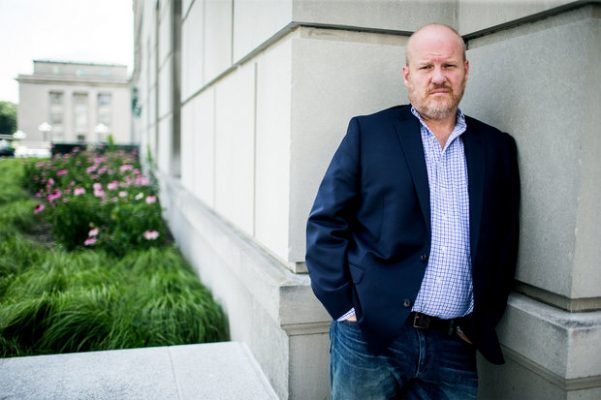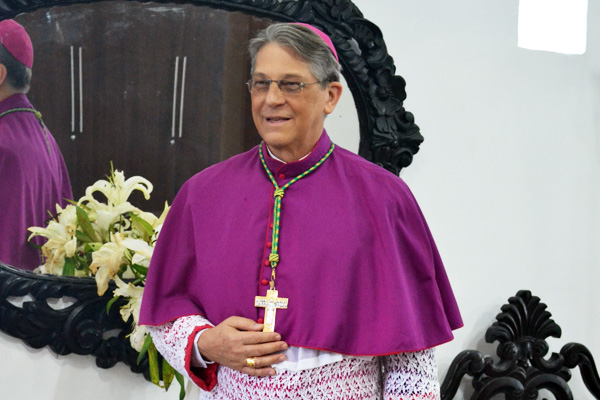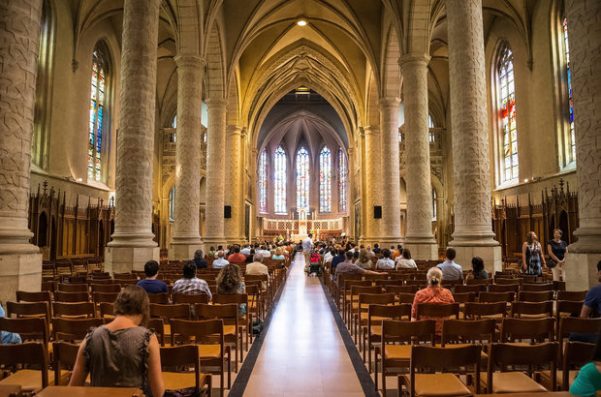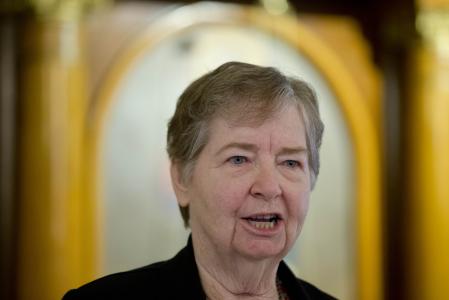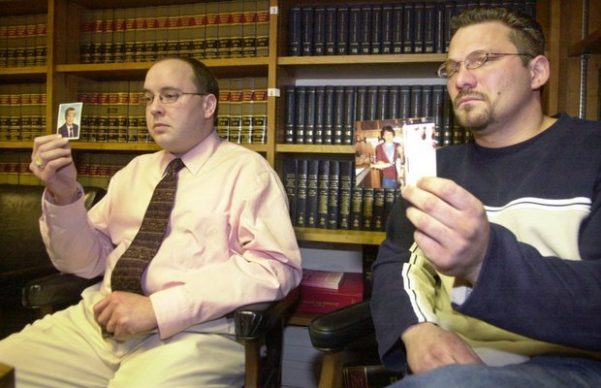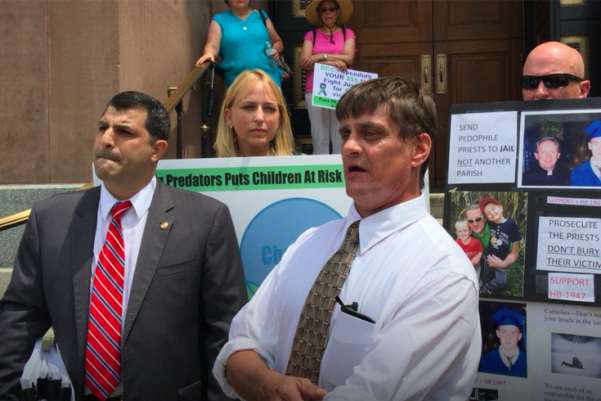
By Brian Hickey
A victim’s canceled meeting with Philadelphia archbishop prompts emotional rally outside cathedral
Monday could have been the day that clergy sex-abuse victim John-Michael Delaney finally got decades of frustration off his chest during a private meeting with Philadelphia Archbishop Charles Chaput.
But in the days since Delaney told PhillyVoice of that meeting – something he’d avoided for decades on account of “not being able to be in the same room as a priest” – officials told the victim of one of the “archdiocese’s most brutal abusers” that the meeting was off.
Delaney said it was payback for going public; an archdiocesan spokesman said the meeting “will take place in due time provided all the parameters [of privacy] are respected.”
That didn’t sit too well with Delaney, who flew up from Tennessee this weekend to speak at a Monday afternoon press conference on the sidewalk outside of the Cathedral Basilica of Saints Peter and Paul on Logan Circle.
There, abuse victims railed against the church’s opposition to House Bill 1947, which proposed an extension of statutes of limitation dictating how long they had to file complaints against their alleged abusers.
The event was spearheaded by state Rep. Mark Rozzi (D-Berks County), who has long championed the rights of victims of child sex-abuse crimes. In fact, Rozzi decided to fly Delaney to town for the event “and give him his voice,” he said.
“I just want to let the bishop know, and the church know, that as much as you try to victimize me, and us, we’re just going to keep coming back,” Delaney said in front of the Basilica’s front doors. “Like I told you on the phone last week, I told you I’d be in Philly. Here I am. You say you don’t want to talk publicly about a meeting with me, yet you oppose a bill publicly? That’s a lot of double standards.
“At least be man enough to sit in a room with a victim and hear what he’s got to say for 60 minutes, because I’m coming for more than 60 minutes this time. I’m going to keep coming back.”
Delaney didn’t speak for more than a minute at the event, where he was joined by several fellow victims – many of whom were not victims of clergy – and those who support their fight.
Rozzi noted that his political peers who battled against the amendment decided “to stand with pedophiles and the institutions that protect them, plain and simple.”
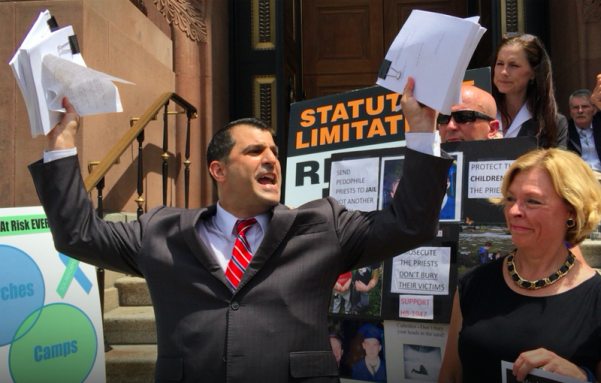
At the end of the 15-minute event, where he was flanked by victims and supporters holding signs, including one that read “Sexual abuse of little boys and girls is SOUL MURDER,” Rozzi threw a stack of grand-jury reports onto the Basilica steps. He then yelled that they “now lay at the archbishop’s feet; he’s responsible for these victims” and for any who may file complaints in the future.
“To all victims of childhood sex abuse, I promise that I will continue to fight for you until my last breath,” he said at the event’s onset before delving into his plans with the stalled legislation. “Not only will I put the retroactive up-to-age-50 component back in House Bill 1947, we will also be sure to include a two-year window to give all victims of childhood sexual-abuse the ability to have those voices heard in a court of law.”
He then turned back to the building behind him, and claimed that, for more than 50 decades, its leaders and all dioceses across the commonwealth “believed they were above the law … and now, they hide behind our laws.”
“Today, I want to make my message clear: I don’t care who you are, what institution it is, I don’t care when the abuse took place, if you abuse children, we are coming for you,” Rozzi said. “If you’re an institution that protected and actively managed, pedophiles, we are coming for you. If you’re a legislator who decides it’s more important to protect pedophiles and the institutions that protected them, we are coming for you.”
When news of Delaney’s meeting broke last week, archdiocesan spokesman Ken Gavin noted that it’s common practice not to publicize such events and shared a fact sheet about all they’ve done for victims. On Monday, he was asked by PhillyVoice for comment on the event at the Basilica.
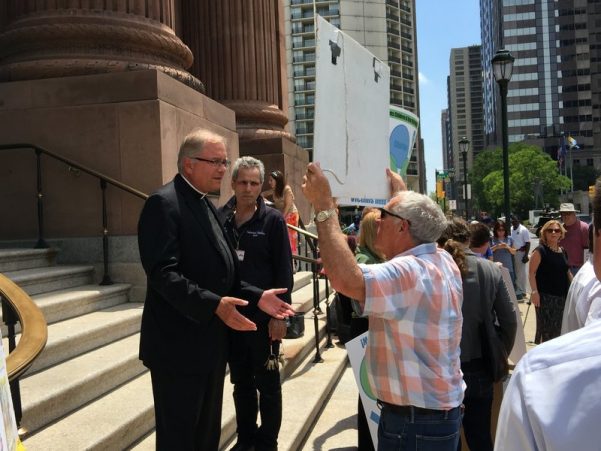
“In the political debate about HB 1947, lawmakers are going to have to bridge the gap between emotion, and logic and the law,” he responded. “The archdiocese does not make its victims services programs available to survivors for political expediency, but out of genuine concern for the well-being of survivors. We offer to lift the burden of accessing resources, services, and support; and we always do this strictly adhering to privacy policies that have been carefully adopted in accordance with best practices in the victim-services field.”
Speakers at the event, however, clearly didn’t agree with this approach.
They included Marci Hamilton, a leading church/state scholar, who noted they’d tried for a decade to get justice for victims.
“It’s time for our elected representatives to start representing the common good, and it’s time for our religious leaders to start ministering to the victims,” she said. “Instead of shutting them out, instead of slamming the door on them in the legislature and in their own buildings, it’s time. Let’s heal the victims and let’s get justice. That’s why we’re here.
“The survivors here behind us are here because they have the strength to go forward. What’s sad is the ones who have suffered so much in this process,” she continued, referring to those who have committed suicide, including Brian Gergely. “We’ve got to start doing the right thing.”
Several victims who also spoke at the Basilica were at a statute-of-limitation reform-strategy meeting held at Hamilton’s University of Pennsylvania office on Monday morning. Both at the event – and in conversations beforehand with PhillyVoice – they spoke about how the legislative stalling affected them personally.
They included a 51-year-old man named Tim – who requested his last name be withheld – who spoke about abuse at the hands of the owner of the corner grocery store in Wyomissing, Berks County where he worked. He knows of at least two or three other young teens who suffered the same sexual abuse by a man who also served as a scoutmaster with a church in nearby Reading.
He said that before the Jerry Sandusky case broke, he’d written to his abuser asking him to pay for his therapy but that “he ignored it all.” The Sandusky case, however, showed him that other victims were seeking legal charges against their abusers.
“I started educating myself if what my options were, and there was not a lawyer who would take my case,” explained Tim, who said his lingering anger issues affect him, his wife and children. “Nothing gets told in Pennsylvania.”
So, he filed suit on his own but after a decade of legal work, it’s still pending as his alleged accuser has “convenient amnesia” as he battles the statute of limitations issues.
“It’s been both the experience of having been abused and then the experience of seeking accountability and justice that is currently ongoing,” he said at Penn. “I tend not to be public about my name. I filed it as John Doe and now I’m aware of John Doe B, C, D, E, I think I’m up to H against this guy.
“As a victim, you can’t just sit. You have to take action. It should have been filed decades ago. It’s not about the money, it’s about the healing of going through it. Money’s irrelevant. For me, and others that have done this that I’ve become aware of, it’s about the movement from being stuck in this position of being a victim and taking some action. At this point, I’m doing everything I can possibly do until a judge tells me it’s over.”
That includes “deposing the pedophile’s wife,” which has already happened.
“I need a window so that I have an opportunity to hold the abuser accountable for what to did to me,” Tim said outside the Basilica. “And that window has to be available for people like me, so we have an opportunity and not some arbitrary year, the age 50, where there’s a cutoff, which makes absolutely no sense at all.”
Other speakers included Sister Maureen Paul Turlish, a lifetime Philadelphian who has taught in archdiocese schools.
“It’s outrageous that the Roman Catholic Church of Pennsylvania is opposing legislative reform in HB 1947. Child abuse is an epidemic in this country,” she said. “By not supporting this bill, they are supporting pedophiles across Pennsylvania.”
Also speaking at Penn and then at the Basilica was Kristen Pfautz Woolley, who was sexually abused by a family friend when she was between the ages of 10 and 12. Now, she’s a clinician who works with child sexual-abuse survivors and recently wrote a column for the York Daily Record about her experiences.
“Having the right to call out your perpetrator in civil court protects future children from being violated,” she said, noting that her attacker has three daughters and grandchildren, but that she “cannot, because of the blocking of the Catholic Church, speak the truth of my perpetrator’s name to protect children even though my violation has absolutely nothing to do with the Catholic Church.
“There is no price tag on the protection of a child. It is very clear: You either stand for protecting children or protecting pedophiles. It’s as simple as that. So, while this is being blocked, I’d like to apologize to all future victims who my perpetrator will violate. My hands are tied until my day in court. Sorry I can’t protect you. I’m going to keep trying.”
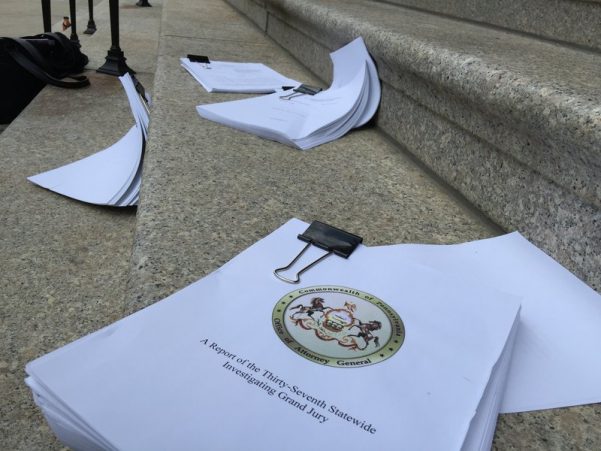
After the event, Rozzi said he’s received countless emails from Catholic parishioners who do not abide by the church’s lobbying push to strip the House Bill of the statutes-of-limitation amendment. He noted that he’s even willing – in case the House leaders get wary of supporting his mission – “to suspend the rules on the House floor and I’m going to put [the amendment] back in. I know I have the support on the House floor. The leaders will not be able to stop me.”
From here, “it’s about continuing to work the issue” as victims from other archdiocese are being interviewed about being abused and how this could end up affecting “the entire Roman Catholic diocese in Pennsylvania.”
“One day, it may not be in 18 months, I’m hoping within three years because good things take time, I know more is coming down the road,” Rozzi said. “You can only deny, deny, deny for so long. There comes a point where you need to be held accountable. You can run but, guess what: I can run faster than you. I can track you down. We are going to make you be held accountable. It’s not over by any means. If the [state] Senate wants to kill it again, let them kill it. The blood’s going to be on their hands again.”
Complete Article HERE!

